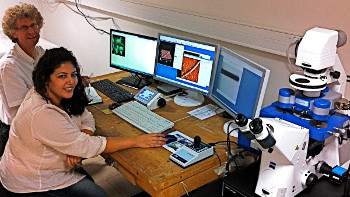JPK Instruments, a world-leading manufacturer of nanoanalytic instrumentation for research in life sciences and soft matter, reports on how researchers from the Université de Paris-Sud and CNRS Montpellier have used the new QI mode of AFM imaging to quantitatively characterize living bacteria without any immobilization.
 Dr Christian Marlière and his PhD student, Samia Dhahri, working with
the JPK NanoWizard®3 system with QI™ mode study living - and gliding- bacteria
Dr Christian Marlière and his PhD student, Samia Dhahri, working with
the JPK NanoWizard®3 system with QI™ mode study living - and gliding- bacteria
Dr Christian Marlière ([email protected]) of the Institute of Molecular Sciences (ISMO) located at the Université Paris Sud, CNRS, Orsay leads a research team to study the dynamics and properties (mechanical, electrical and electro-chemical) of living bacteria in purely controlled physiological conditions at nanometer scale: motility or adhesion processes of bacteria on solid substrates, biofilms formation, the influence of light on moving properties of cyanobacteria, effects of antibiotics on bacterial membranes and biofilm etc.
One subject of importance is the correlation between the physical, chemical and biological processes involved at sub-micrometer scale around bacteria and their biofilms plus the resulting variation of electrical signals as measured with common macroscopic methods such as electrical conductivity, impedance or spontaneous potential measurements currently used in geophysics.
These scanning probe techniques are used in parallel with optical methods having high spatial and temporal resolution such as fluorescence confocal microscopy, Sum Frequency Generation spectroscopy (SFG), STimulated Emission Depletion microscopy (STED), Photo-Activated Localization Microscopy (PALM) and Total Internal Reflection Fluorescence (TIRF) microscopy.
Describing his motivation for using AFM in his research, Dr Marlière said "Thanks to AFM, we are able to make measurements of local mechanical, electric and electro-chemical properties at very well controlled spots on or over the bacteria. JPK's design will enable us to couple it to the advanced microscopies listed above.
"However, there is something most valuable in the latest JPK NanoWizard®3 AFM system: Quantitative Imaging. Our recent work is based on an original method relying on an improved combination of a gentle sample preparation process and the JPK QI™ mode.
"We were able to image living bacteria by AFM in their standard (physiological) liquid environment without any external immobilization step that has been unanimously described in literature as mandatory. Furthermore, the native gliding movements of some bacteria (such as cyanobacteria) upon the surface were observed by AFM and important information about the gliding mechanism was obtained."
An example of this work has been published in a paper entitled "In-situ determination of the mechanical properties of gliding or non-motile bacteria by Atomic Force Microscopy under physiological conditions without immobilization" (citation:PLoS ONE 8(4): e61663. doi:10.1371/journal.pone.0061663). The lead author was Samia Dhahri, one of Dr Marlière's PhD students in Montpellier. She is pictured here with Dr Marlière and the JPK system.
For more details about JPK's NanoWizard®, QI™ mode and applications for the bio & nano sciences, please contact JPK on +49 30533112070, visit the website. Or, see more on Facebook and on YouTube.
About JPK Instruments
JPK Instruments AG is a world-leading manufacturer of nanoanalytic instruments - particularly atomic force microscope (AFM) systems and optical tweezers - for a broad range of applications reaching from soft matter physics to nano-optics, from surface chemistry to cell and molecular biology. From its earliest days applying atomic force microscope (AFM) technology, JPK has recognized the opportunities provided by nanotechnology for transforming life sciences and soft matter research.
This focus has driven JPK's success in uniting the worlds of nanotechnology tools and life science applications by offering cutting-edge technology and unique applications expertise. Headquartered in Berlin and with direct operations in Dresden, Cambridge (UK), Singapore, Tokyo and Paris (France), JPK maintains a global network of distributors and support centers and provides on the spot applications and service support to an ever-growing community of researchers.